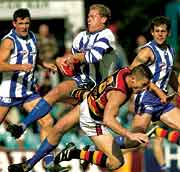
Seeking desperation

|
|
| COLLISION COURSE: Digby Morrell of the Kangaroos and Mark Bickley of the Crows collide during the match on Sunday at Manuka Oval. Photo: GETTY IMAGES | |
A good old-fashioned flogging on the training track still works wonders.
When you cut out the science, the nutrition and tactical side of the game, the one constant is that football evolves around sheer determination.
Richmond and the Kangaroos have both been under the pump in recent weeks after showing a lack of hardness and hunger out on the field.
How did they turn it around? They had match practice in the week leading up to their next game.
Danny Frawley put the Tigers through a searching workout two weeks ago and they've come out and beaten Sydney and the Eagles.
Denis Pagan called on the tried and true method of match practice last week after two heavy losses and the Kangas turned it around against Adelaide in Canberra.
Pagan did not name names last week, did not come up with excuses because he knew what the problem was - a simple lack of desperation. That is what makes him such a great coach.
He fixed the problem mid-week by putting some physical pressure on the whole side and getting inside the head of a few of his senior players.
He started David King, Byron Pickett, Shannon Grant and Brent Harvey on the bench against the Crows to just remind them that their places in the side are not guaranteed.
A lot of coaches in this day and age are reluctant to use match practice mid-week in fear of injuries and retribution from the media.
If a Wayne Campbell or a Glenn Archer broke a leg during those rigorous sessions the tactic would have been labelled dumb.
But the injury could happen any day and it is better to have one player out and the team back to playing solidly rather than having everyone on the paddock lacking desperation.
I watched both the Richmond-Sydney and Kangaroos-Adelaide matches with interest and while they weren't in great touch skills-wise, it was their endeavour to win the ball in dispute that won the day.
This remedy not only works at the top level, it can be applied at every level.
A mate of mine, Sean Simpson, used it recently with great success at his GFL club St Albans.
After getting flogged by St Mary's about a month ago, Simmo thought he would cleanse their souls by having a hard week on the track.
He worked their butts off with match practice and plenty of tackling to make them realise you have to be ferocious at every contest.
Football, as we so often hear, is a game of inches, and that one extra bump, tackle or block can make a difference.
St Albans has come out and won three out of the past four, with the only loss coming via poor kicking for goal.
Many coaches have used the tactic in their time. Malcolm Blight was big on it during his time at Geelong.
If we did 120 hard things during a game, and by that I mean 120 blocks, tackles, smothers, shepherds, we won the game.
Over time people get lazy, it is only natural. As human beings we like to find the easy way out.
Over the course of six to eight weeks our ``hard things'' chart would drop to 110, 100, 90, and bang, then we got beaten.
Blighty would put us through a couple of hard sessions, the hardness returned to our game, and the results followed.
Sounds simple doesn't it? Pagan has been using it with great success and that's why the financially-crippled Kangaroos have stood the test of time.